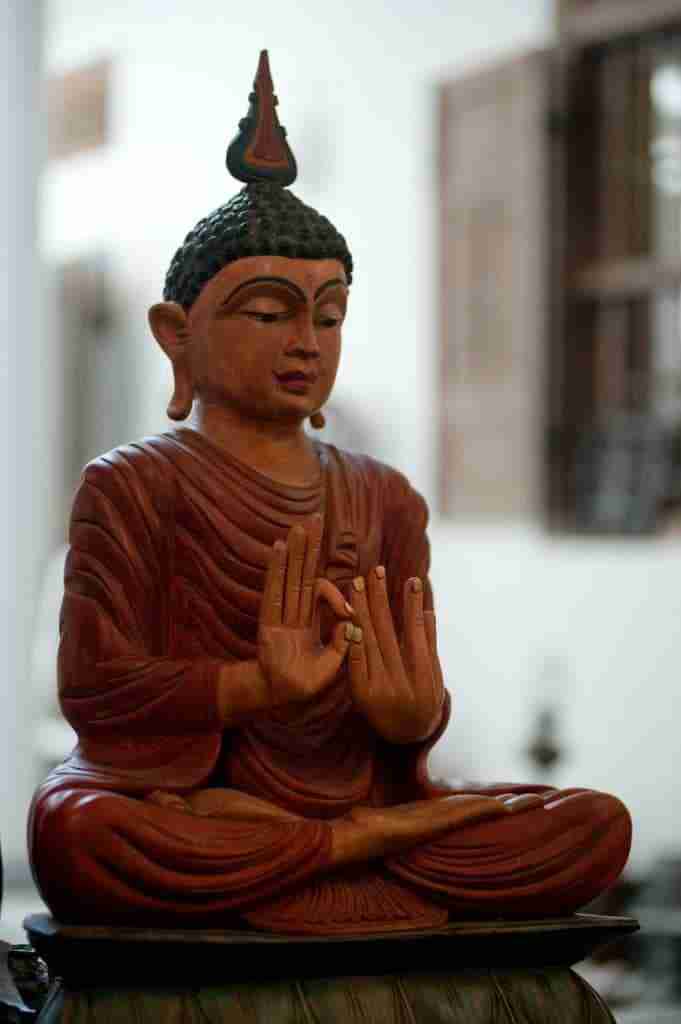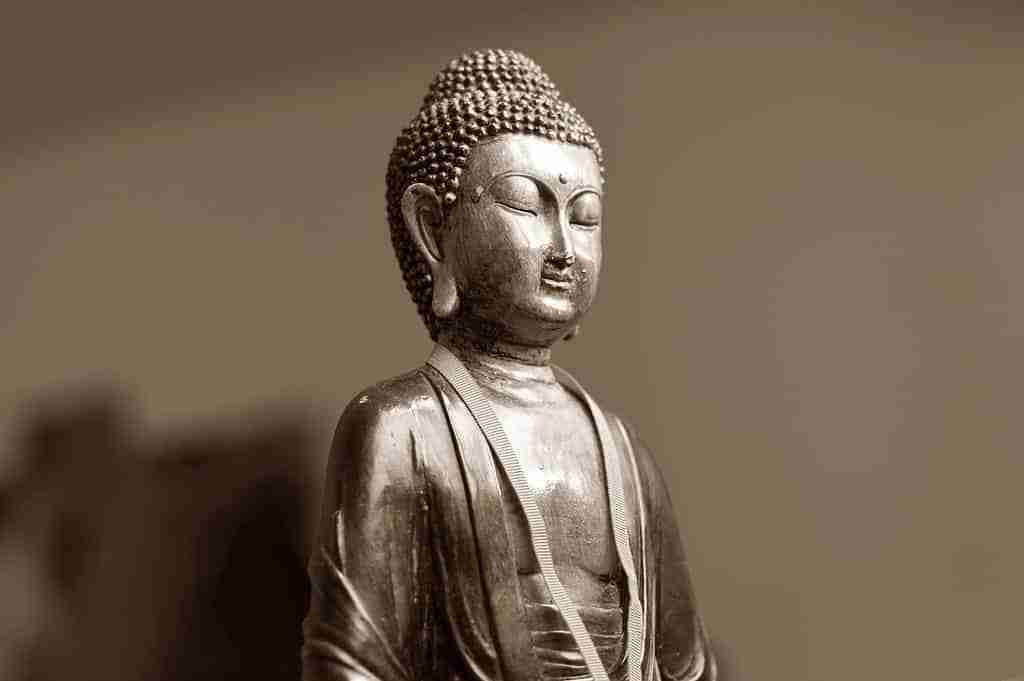This blog post is an exploration of different spiritual traditions and how they regard Awakening Spiritually and Spiritual Enlightenment, including Eastern Religions like Hinduism, Buddhism and Taoism, and Western Traditions like Christianity and New Age Spirituality.
As we all try to make sense of this mysterious universe, many spiritual traditions have emerged throughout history. Each culture has its own unique take on spirituality and the concepts associated with it, such as awakening spiritually. It is like a grand jigsaw puzzle that deserves our attention in order to understand how these various pieces fit together.
Awakening Spiritually is a hugely important topic for those seeking enlightenment. We often assume that there is only one path or journey toward understanding our true being and place in the Universe; however, each tradition offers something unique and valuable. By exploring them side-by-side we can gain insight into what lies beneath the surface of human existence.
The search for meaning within ourselves can sometimes be daunting, but by looking at diverse perspectives through an open mind, we can come closer to achieving inner harmony and peace. This article aims to bring clarity and provide answers about Awakening Spiritually through an exploration of ancient religious practices from around the globe.
What does it mean to Awaken Spiritually?
An old Chinese proverb says, “A journey of a thousand miles begins with the first step.” Spiritual awakening is much like that – it’s a journey of personal growth and conscious awareness that leads to greater clarity in our lives. From Eastern religions such as Hinduism, Buddhism and Taoism, to Western traditions like Christianity and New Age Spirituality, there exist many paths toward spiritual enlightenment.
Spiritual growth often refers to the process by which an individual opens up their consciousness to new levels of understanding about life’s mysteries. It involves trusting one’s intuition and inner wisdom more than anything else, allowing one to connect deeper to the power of awareness within themselves.
This can take various forms including meditation, reading scriptures or sacred texts, contemplation on philosophical ideas, service work for others, or simply being present in nature. All these activities help us develop our sense of self-knowledge and cultivate spiritual intelligence.
At its core however, awakening spiritually is all about understanding who we are beyond what we think or believe ourselves to be: a limitless being connected deeply with something far greater than ourselves – something mysterious but powerful at the same time as it is beyond the realm of knowledge as that which is known and not known, yet it is not unknowable.
And so, while each path may vary slightly, they all share a common goal: to awaken individuals from their slumbering state of indifference and bring them closer to experiencing fully alive moments each day. With this wisdom comes an appreciation for life and whatever challenges come our way; ultimately leading us back home – to peace within ourselves.
Definition of Hinduism and How it Regards Awakening Spirituality

How Hinduism regards Spiritual Awakening…
Hinduism is an ancient tradition that has been practiced for thousands of years. Many people have found the awakening spiritually within this religion and its practices. It can be described as a path to inner transformation, mindfulness, and self-discovery; all of which are key components when it comes to cultivating inner stillness.
This journey begins with understanding certain metaphysical concepts such as Atman (the individual soul) and Brahman (universal spirit). Through meditation and contemplation, one may begin to comprehend these concepts in order to reach moksha or liberation from suffering. Furthermore, Hinduism offers various paths depending on the practitioner’s inclinations: Karma Yoga, Bhakti Yoga, Raja Yoga, Jnana Yoga etc., each of which will help bring them closer to their goal of enlightenment.
In addition, Hinduism also promotes several rituals that assist in self-reflection and devotion including puja ceremonies (worshipful offerings), chanting mantras, visiting temples/shrines, fasting on holy days and more. All these aspects combined present us with an opportunity to explore our inner depths so we can tap into our highest potential of wisdom and bliss. By engaging in these activities we become more conscious of ourselves while at the same time connecting with something greater than ourselves – the divine essence within everyone.
It is clear then why many people turn towards Hinduism when seeking answers about awakening spiritually – it provides individuals with both practical tools and philosophical teachings needed for attaining personal growth. This faith gives us access to different ways of approaching life through which we can unlock hidden treasures deep inside our hearts – allowing us to experience true contentment and joy in life no matter what trials come our way. With this knowledge in hand, next let’s take a look at Buddhism and its relevance towards awakening spiritually…
Definition of Buddhism and How it Regards Awakening Spirituality

How Buddhism regards Spiritual Awakening...
Buddhism is a spiritual tradition with roots in ancient India. It is based upon the teachings of Siddhartha Gautama, commonly referred to as the Buddha. Buddhism teaches that liberation from suffering and unhappiness can be found through mindful living and meditation. It emphasizes personal development in order to achieve inner peace, awareness, and enlightenment. As such, there are many ways in which Buddhist teachings relate to the concept of awakening spiritually.
A few key aspects of Buddhist practice that support this goal include:
- Mindful Living – Buddhists strive to become more aware of their thoughts and feelings by observing them without judgement or attachment. This helps us to understand our experience better and allows us to have control over how we respond to it.
- Meditation – Meditation plays an important role in Buddhist practice, allowing practitioners to focus on being present moment-to-moment instead of getting lost in rumination about past events or worrying about what could happen in the future. Through sustained meditative practice one can gain greater insight into reality and develop compassion for oneself and others.
- The Benefits of Mindful Awareness – By becoming conscious of our habitual thought patterns we can make changes that help us live healthier lives, both mentally and physically. Furthermore, mindfulness helps us appreciate life’s simple pleasures so that we may find contentment even amidst difficult circumstances.
- Personal Development – Buddhism encourages self-reflection on the nature of existence so that individuals may discover new perspectives on life, leading them closer towards awakening spiritually and freedom from suffering.
Overall, Buddhism offers numerous pathways for those who seek deeper understanding within themselves while also providing practical tools for increasing physical health and mental well-being – all essential components necessary on the path toward achieving spiritual growth . As such , its relevance to awakening spiritually cannot be understated . Moving forward , let us explore further how Taoism relates to this same question…
Definition of Taoism and How it Regards Awakening Spirituality
How Taoism regards Spiritual Awakening...
Taoism is an ancient Chinese philosophy and religion with a history of over 2,500 years. It has been estimated that there are currently between 15-20 million people worldwide who practice this spiritual tradition. Its core concept is the Tao or ‘way’, which teaches its adherents to live their lives in harmony with the natural world around them. This timeless wisdom emphasizes personal growth and self-exploration, as well as connecting with one’s higher self for a greater understanding of life’s purpose. In terms of awakening spiritually, Taoism encourages us to be mindful of our actions and interactions, so we can reach enlightenment through inner reflection.
The central text of Taoism is Lao Tzu’s ‘Tao Te Ching’, written sometime during the 6th century BC. The book contains 81 chapters full of poetic verses discussing topics such as living in harmony with nature, following the way of least resistance, understanding the balance between yin and yang, and finding contentment within ourselves without relying on outside sources. By closely studying its teachings, one can gain insight into how they might cultivate a closer connection to their true selves while attaining personal growth along their journey towards awakening spiritually.
In addition to its philosophical principles, many followers also adopt certain practices like meditation or qigong (a form of martial arts) in order to stay grounded in the present moment and focus on staying connected with their divine source energy. Through these activities, individuals can observe themselves objectively by becoming aware of any unconscious patterns that may be holding them back from achieving spiritual liberation. By incorporating mindfulness techniques into everyday life it becomes easier to recognize moments when we need more clarity or should take action to move closer to our desired outcome without compromising our values or beliefs in the process.
Definition of Christianity and How it Regards Awakening Spirituality
How Christianity regards Spiritual Awakening...
Christianity is an ancient belief system that has been practiced for thousands of years, and it holds a special relevance to the concept of awakening spiritually. It is one of the most profound paths towards self-awareness, meditation and ultimately, full spiritual enlightenment! With its rich history spanning decades upon decades, Christianity offers seekers a powerful way to connect with their innermost divine nature through prayerful contemplation and reflection on biblical teachings.
The core principle behind Christian spirituality lies in believing in Jesus Christ as the Lord and Savior – but this doesn’t mean that you have to subscribe to any specific religious denomination or doctrine. Instead, what matters more is how you personally understand these beliefs and apply them in your everyday life. This means cultivating an attitude of reverence towards God while embracing a path of compassionate love and service towards all living beings. In fact, many Christians believe that opportunities for genuine spiritual growth come from responding positively to challenging situations rather than running away from them.
This kind of faith based approach encourages us to take responsibility for our own actions instead of relying on external factors for salvation or freedom from suffering. Through such practices we can become evermore aware of ourselves and strive earnestly towards achieving greater harmony within our lives as well as society at large – which are essential steps required for true awakening. Transitioning into deeper states of consciousness may be difficult at first; however by trusting in divine guidance along with dedicated practice over time we can eventually reach a place where lasting peace and joy reside…
Definition of New Age Spirituality and How it Regards Awakening Spirituality

How New Age Spirituality regards Spiritual Awakening...
New Age Spirituality stands as a broad and often ill-defined term, but it is best understood as an approach to life that seeks self realization through conscious living. It has a deep connection with awakening spiritually and can be seen in many ways as the path to enlightenment.
At its core, New Age Spirituality focuses on personal transformation by embracing positive thought patterns and exploring one’s true nature. This includes developing practices such as meditation, mindfulness, creative visualization, and energy healing to help reach higher levels of consciousness. Additionally, this type of spirituality also encourages people to embrace their own unique gifts and abilities while connecting with their inner guidance system. By doing so, individuals can achieve greater understanding about themselves and their purpose in life.
In order to truly experience spiritual awakening within the framework of New Age Spirituality we must first understand our current state of being – where we are at this moment in time – before we can move forward towards our desired destination. We must take responsibility for our actions and open ourselves up to new possibilities if we wish to progress along this journey of self discovery. Through courageously facing challenges head-on while maintaining balance between body mind spirit, only then will we find the clarity needed to make meaningful changes in our lives which will ultimately lead us closer towards our highest potentials.
The next step on this spiritual journey is understanding how eastern and western traditions intersect with regards to awakening spiritually….
The Intersection Between Eastern And Western Traditions Awakening Spiritually and Spiritual Enlightenment

The spiritual journey is a path of deepening self-awareness, where one discovers the beauty that lies within. Our quest for inner growth and transformation can be found in both eastern and western traditions, offering us an opportunity to explore how these two paths intersect with the concept of awakening spiritually.
As we embark on this exploration, let us first imagine standing at the crossroads between east and west – two distinct worldviews illuminated by the light of meditation and understanding. We are invited to contemplate their unique approaches towards uncovering our true nature, discovering ways to foster greater peace and harmony in our lives through self-discovery.
Eastern religions like Hinduism, Buddhism, and Taoism as well as Western traditions such as Christianity have much to offer when it comes to exploring awakening. Each tradition provides valuable insights into our own internal landscape; inviting us to deepen our connection with ourselves while learning new perspectives on life’s mysteries. With each step taken along this winding road, we gain a more profound appreciation for the interconnectedness between spirit, body and mind.
Our next stop along this journey will take us even further back in time – tracing the historical roots of Eastern and Western Traditions and their impact on awakening today… …to help us understand the ways that spiritual practices can help us to lead more meaningful and fulfilling lives.
Historical Roots of Eastern and Western Traditions and the Impact on Awakening Spirituality

The spiritual journey of awakening is a path that has been explored by many cultures across the world since ancient times. From the earliest days of Hinduism, Buddhism and Taoism in Eastern traditions to Christianity and New Age spirituality in Western ones, there is an undeniable connection between these philosophies and the concept of connecting with one’s true self. Fascinatingly, recent studies have shown that over 8 million people worldwide are now engaging in some form of spiritual practice related to their own personal awakening!
We can trace the historical roots of both eastern and western traditions back centuries, exploring how they relate to this powerful idea of self-awareness. In doing so we gain insight into how each tradition impacts our understanding of awakening spiritually; from the rituals practiced within Hinduism such as meditation or yoga to Jesus’ teachings on love for those around us in Christianity. All these practices help nurture a deeper connection with ourselves which can lead us down The Journey To Enlightenment – where we experience freedom from suffering through developing greater self awareness.
Although much about life still remains a mystery, it is clear that beliefs, practices and rituals play an important role when it comes to cultivating meaningful connections with ourselves and achieving inner peace. By taking time to reflect upon our relationship with various spiritual traditions, we begin unlocking profound power within ourselves – allowing us to tap into a divine way of living filled with joy and abundance.
Beliefs, Practices and Rituals of Hinduism and their Relationship to Awakening Spiritually

Spirituality is a journey of self-discovery and transformation, which many ancient traditions have explored in depth. Hinduism is no exception, with its profound spiritual teachings providing an opportunity to connect with one’s inner peace and harmony. Through its beliefs, practices, and rituals, the path of awakening can be pursued by anyone seeking to deepen their understanding of themselves.
The central concept of Hinduism revolves around Brahman – the absolute truth that lies beyond words and concepts. To reach this transcendental state, Hindus practice meditation and yoga as ways to access Brahman within themselfs. In addition to these physical activities, chanting mantras are also used as a means for connecting with higher states of consciousness. By engaging in these disciplines consistently over time, Hindus strive to become more aware of the divine energy existing within each person.
Through this process of self-realization comes greater clarity about who we are on a deeper level. The various aspects associated with Hinduism such as karma and reincarnation help us see how our actions shape our destiny in life. This realization helps us cultivate greater mindfulness when it comes to making choices based on what serves our highest good. Ultimately, through cultivating awareness of ourselves and others, we come closer to achieving awakening within ourselves – something accessible to all regardless of religious or cultural background.
Beliefs, Practices and Rituals of Buddhism and their Relationship to Awakening Spiritually

Buddhism is a spiritual tradition that emphasizes mindful practice and personal development as the path to inner peace, tranquility and ultimately, awakening spiritually. It teaches practitioners to be aware of their thoughts, feelings and actions in every moment. This allows them to attain greater levels of self-understanding which then leads to higher awareness of our connection with all living things. As such, it can bring about an experience of oneness and integration with the universe.
In Buddhist teachings, meditation plays an important role in this journey towards awakening spiritually. Through meditation one can observe the ebb and flow of physical sensations, mental states and emotions without judgment or attachment. By becoming more aware of these fluctuations we come closer to understanding our true nature beyond thought constructs like ‘I’ or ‘me’. It helps us see how everything around us is interconnected and part of a larger whole – something deep within us longs for this realization.
The practices found within Buddhism are designed to cultivate insight into the workings of life so that practitioners can find liberation from suffering and discover freedom from worldly attachments. With its emphasis on mindfulness, compassion and non-attachment it provides a safe space for individuals looking to explore their spirituality while gaining clarity on difficult questions regarding purposeful existence. The answers may not always be clear but by deepening our own practice we become open to deeper revelations than those accessible through ordinary mind states alone – enlightenment awaits!
By engaging in this ancient wisdom handed down through generations we have access to powerful tools that support our journey towards awakening. Each step brings us closer towards realizing our highest potential; ever unfolding layers of truth await those who seek them out intently with an honest heart.
Beliefs, Practices and Rituals of Taoism and their Relationship to Awakening Spiritually

To the surprise of many, Taoism and awakening spiritually are deeply intertwined. Just as with other spiritual traditions, the path to greater self-realization through Taoism is a journey filled with mindful existence, personal transformation and inner strength. This ancient tradition holds within it great stability that can be attained by those seeking true enlightenment.
As Swami Sarpriyananda said: “The mind needs to go beyond its limitations in order to reach a higher state of understanding” – this statement rings especially true when exploring the beliefs, practices and rituals of Taoism in connection with awakening. According to Taoist teachings, the body should be harmonized with the natural flow of energy found throughout nature – known as Qi or Chi – which involve breathing exercises such as Qigong. Furthermore, meditation plays an important role in one’s ability to let go of attachments while enhancing mindfulness, allowing for greater clarity on their quest toward self-discovery. Other key components include cultivating wisdom through traditional texts like The Dao De Jing (also known as The Classic Of The Way And Its Power), adhering to ethical values based upon balance and harmony between Yin and Yang energies, developing martial arts skills for physical discipline, and actively participating in ritual ceremonies dedicated to various deities.
These core principles provide practitioners with powerful tools for unlocking their highest potential; from achieving mental fortitude necessary for overcoming obstacles during times of adversity to embracing personal transformation so they may experience unity consciousness and find peace within themselves. In doing so, we can begin using our newfound awareness to foster a stronger sense of self-love that will lead us closer towards becoming spiritually awakened beings who have reached a profound level of insight into life itself.
Beliefs, Practices and Rituals of Christianity and their Relationship to Awakening Spiritually

Christianity is a spiritual tradition that offers many opportunities for personal growth and awakening. It instructs its followers on how to live life in the most meaningful way, providing them with an understanding of their place in the universe. Throughout history, Christianity has been one of the major sources of inspiration for people seeking greater insight into themselves and their faith. Here we explore some of the beliefs, practices and rituals associated with this religion which can be used as part of a journey towards awakening spiritually.
To begin, meditation serves as an effective tool to develop inner awareness and clarity, enabling believers to contemplate upon their values and purpose. Building a daily practice is essential in order to stay connected to your true self while also allowing you to become empowered by your own convictions. Additionally, mindful reflection helps us identify our patterns of thinking or behaviour which may be blocking us from achieving our highest potential.
Moreover, there are other aspects within Christianity that foster personal development such as prayer, confession and acts of service – all leading to deeper soulful connection with oneself and God. These various components provide Christians with an opportunity for spiritual enlightenment through engaging with Scripture teachings and connecting with divine presence. By embracing these elements it’s possible to discover profound truths about yourself that will enable you to lead more fulfilling lives filled with joy and peace.
This exploration demonstrates how Christian traditions offer individuals valuable resources so they can take steps forward in their journey towards spiritual awakening while promoting greater harmony between body-mind-heart-spirit connections.
Beliefs, Practices and Rituals of New Age Spirituality and their Relationship to Awakening Spiritually

New age spirituality is a modern call for people to explore their inner depths in order to awaken spiritually. It encourages mindful self development, by awakening the soul and understanding one’s true nature. Symbolic of this journey is discovering how rituals, beliefs and practices can guide us into a profound awakening spiritually.
One such practice that belongs to new age spirituality is meditation. Meditation helps reduce stress while allowing an individual to self reflect on the deeper meanings of life so they can be more in tune with their own consciousness. Other activities like yoga, chanting mantras, developing mindfulness and reading spiritual literature are also encouraged as part of the process of becoming more aware of oneself and gaining insight into the inner workings of being alive.
Moreover, understanding our connection to other living beings (both human and non-human) comes from engaging in meaningful conversations with ourselves as well as others around us; thus helping create an anchor point from which we may grow further along our spiritual path. By learning about different traditions and cultures through these deep conversations, we gain insight into what truly matters: inner understanding, compassion for all things and the realization that everything is interconnected within the universe. In doing so, we become better equipped to proceed down our paths towards greater spiritual awareness.
How Different Traditions are Influencing Current Practices of Awakening Spiritually

In today’s world, awakening has become an increasingly popular concept. According to recent studies, 68% of people in the United States believe that they have had a spiritual experience or feeling in their lifetime. This demonstrates how ingrained spirituality is within humanity and its potential for self-discovery. As such, it is important to explore different traditions and how they influence current practices of awakening spiritually.
The various cultures, customs and religions around the globe offer unique perspectives on spiritual enlightenment, from Eastern beliefs like Hinduism, Buddhism and Taoism to Western faiths like Christianity and New Age Spirituality. Each tradition contains rituals and teachings that can help guide individuals towards mindful awareness, allowing them to gain insights into themselves through reflection and meditation. For example, aspects of Buddhist philosophy focus heavily on cultivating an awakened presence by being mindful of one’s thoughts and actions. Similarly, Christians may use prayer as part of their journey toward understanding God’s will while Hindus often practice mantras to reach a higher level of consciousness.
Regardless of religious background or personal preference, each path provides valuable tools for seeking inner truth and achieving greater clarity about oneself. By engaging with these ancient wisdom traditions we are able to understand our own power more deeply – this knowledge can then be used to manifest positive changes in both ourselves as well as the outer physical world around us. To truly make progress along the road towards awakening spiritually requires dedication but also helps foster a deeper connection between ourselves and all living beings. And so by studying multiple paths at once we can better appreciate the many ways available for attaining true harmony with nature and acquiring peace within our souls..
The Future of Awakening through a Multi-Faith Perspective

In the modern world, awakening spiritually is no longer bound to a single tradition; its relevance now spans across various faith backgrounds and spiritual practices. From mindful meditation to self-exploration and awakened presence meditations – people from all walks of life are beginning to find their own paths towards enlightenment. Yet, this path can be confusing without knowledge of different traditions that have influenced current beliefs on spirituality.
Therefore, it is important to look ahead at how these diverse faith perspectives could shape future developments in spiritually conscious living. By recognizing each other’s values, we can create an environment where multi-faith dialogue is encouraged – allowing us to appreciate our differences within a unified framework of understanding. With an open mind and heart, we can discover shared goals amongst our religious diversity and move forward into a deeper understanding of ourselves as well as others.
We must recognize that the best way forward with any kind of spiritual exploration lies in acknowledging multiple ways of knowing rather than just one way. Through learning about different faiths and discovering what resonates most deeply within us, we will gain insight into our highest potential for growth and transformation. In revisiting ancient texts or sacred stories through fresh eyes, new doors open up into realms previously unknown – offering renewed hope for humanity’s collective journey towards greater peace and harmony.
Common Questions

What Are The Benefits Of Awakening Spiritually and Spiritual Enlightenment?
What is spiritual awakening is a common question.
The journey of awakening spiritually is a thrilling one. It’s akin to an oasis in the desert, providing us with moments of inner peace amidst life’s turbulence and struggles. Through this process, we can learn to access our higher consciousness and see the world through different eyes – gaining clarity on the deeper meaning and purpose of life.
Unlocking these gifts brings many benefits; it provides nourishment for both body and soul. As we open ourselves up to new perspectives and practices, we naturally begin to tap into a renewed sense of energy and enthusiasm as well as increased self-awareness, compassion towards others, improved concentration, greater contentment, enhanced intuition…the list goes on! Having such heightened sensitivity allows us to be more conscious about how our thoughts, words and actions affect our lives – enabling us to make healthy choices that are aligned with our true selves.
In addition, those who seek knowledge from multiple traditions benefit from an even richer experience; each tradition offers unique teachings which when combined together create a multifaceted perspective – allowing us to gain insight into various aspects of life’s complexities. This practice also encourages us to maintain an attitude of openness so that we are able to embrace all paths without being too attached or judgmental. By developing this kind of non-duality understanding we become better equipped at dealing with the challenges in today’s changing environment while still maintaining harmony within ourselves.
We have thus much to gain by expanding our awareness beyond boundaries: seeking out wisdom from diverse sources helps bring balance back into life – transforming it into a beautiful symphony where every note contributes something special.
What is Spiritual Awakening – How Can I Apply Awakening In My Daily Life?
The concept of awakening spiritually is one that has fascinated people for centuries. It brings with it the promise of inner peace, clarity, and a deeper understanding of our own nature. But how can we apply this ancient wisdom to our everyday lives?
As we explore the various spiritual traditions and their teachings on awakening spiritually, there are certain practices which we can adopt in order to bring greater awareness into our life. By learning to be mindful throughout the day – paying attention to ourselves and others around us – we begin to develop an appreciation for the present moment. We become aware of any thoughts or feelings that come up without judgment and learn how to respond rather than react. With practice, mindfulness helps us cultivate emotional intelligence as well as allowing us to recognize when unhelpful thought patterns arise so that we may choose healthier responses.
Furthermore, many spiritual traditions have meditation at their core; it’s considered essential for connecting with our higher selves and deepening self-awareness. Through regular practice, such as focusing on breathing or repeating mantras, meditating expands our consciousness beyond mental chatter and allows us to step back from difficult situations more easily. This provides us with invaluable insight into our relationships with those around us and helps us let go of attachment towards material wealth or other sources of stress. Even just a few minutes per day can transform mindsets over time!
Ultimately, by integrating these various techniques into one’s daily routine, an individual has the potential to foster profound shifts within themselves while gaining valuable tools for living life more peacefully – all through the power of awakening spiritually.
What Is The Role Of Meditation In Spiritual Awakening?
Meditation is an ancient practice that has been used for centuries to cultivate inner awareness and awakening spiritually. It has its roots in many different traditions, from Hinduism and Buddhism to Christianity and New Age Spirituality. By cultivating a sense of stillness, meditation helps us become more aware of our thoughts, emotions and physical sensations – allowing us to observe them with greater clarity and equanimity.
When we meditate regularly, we can begin to see beyond the illusion of separation between ourselves and others – thus leading to a deeper understanding of our interconnectedness with all living beings. This insight generates compassion which fuels further spiritual growth. As we continue on this journey towards self-realization, meditation becomes even more essential as it provides much needed balance during times of transformation by helping us stay present amidst chaotic circumstances and spurts of inspiration.
The regular practice of meditation creates space within ourselves so that we may listen deeply to our intuitive guidance rather than relying solely on external influences or habitual patterns when making decisions. We learn how to be mindful in every moment; not just while seated in meditation but throughout each day in order to recognize opportunities for learning and growth even in the most mundane tasks. In this way, meditation serves as an anchor that keeps us connected to our true nature no matter where life takes us.
Are There Any Books Or Resources Available To Learn More About Awakening?
Exploring the concept of awakening spiritually is an intriguing and captivating journey! It can lead us to discover hidden truths about our existence, as well as open up a world of possibilities. We may be wondering: Are there any books or resources available that can help us on this quest for enlightenment? The answer is a resounding YES!
There are many wonderful books out there that offer valuable insight into the process of awakening spiritually. From ancient texts such as Upanishads and Bhagavad Gita to more modern works like Ramana Maharshi’s ‘Talks with Sri Ramana Maharshi’ and Eckhart Tolle’s ‘The Power of Now’, these writings provide invaluable information about how to start your journey towards inner peace and awareness. There are also plenty of online resources available too – websites, podcasts and even YouTube videos which cover topics related to spirituality in great depth.
In addition, meditation plays an important role in helping one gain deeper understanding of oneself and its connection to the divine. Regular practice opens up the path to greater self-awareness while allowing us to connect with our true nature – something we all yearn for but often don’t know how to find it. By learning techniques such as mindfulness and visualization, we can reach levels of consciousness beyond what is possible with just intellectual knowledge. With continued dedication, we will eventually come closer to achieving ultimate liberation from suffering by attaining true awakening!
How Are Awakening Spiritually And Mindfulness Related?
We often hear the terms ‘awakening spiritually’ and ‘mindfulness’. What do they mean, and how are they related? The answer lies in the exploration of different spiritual traditions.
Mindfulness is a practice that helps us to be present in our lives – to stay focused on what is happening right now rather than worrying about the past or future. This can help bring clarity and inner peace. On the other hand, awakening spiritually refers to an experience where an individual transcends their ego-identity and finds themselves connected with something greater than themselves – a higher power or ‘God’ if you will. It involves a shift in perspective and understanding of life.
The two concepts are deeply intertwined as mindfulness leads to deeper levels of awareness which brings one closer towards self-realization, leading eventually to awakening spiritually. Mindful meditation allows for recognition of patterns within oneself so that one can break free from conditioned behavior that blocks access to true insight into one’s essence—the divine source from which we all come from. As such, when practiced regularly it creates an open path for spiritual progress.
TIP: When exploring the connection between awakening spiritually and mindfulness, it’s important to remember that these practices should not replace any religious beliefs or rituals you may have; instead use them as tools for deepening your own personal spirituality journey.
In this Light…

Awakening spiritually is a concept that is deeply rooted in many of the world’s religions and philosophies. It can be seen as a journey to greater understanding and enlightenment, one which requires dedication, commitment and discipline. Through meditation, mindfulness practices and study of spiritual traditions we are able to gain insight into our own inner being and experience profound levels of joy, peace and contentment.
This process of transformation does not happen overnight – it requires time, patience and practice. However with an open heart and mind – something that Swami Sarpriyananda refers to as ‘divine grace’ – one can make remarkable progress on this path like never before! Though steeped in mystery, awakening spiritually has become accessible to all who seek it; its power to transform lives so immense it could almost be described as a superpower…like nothing else on Earth!



